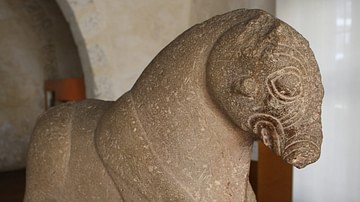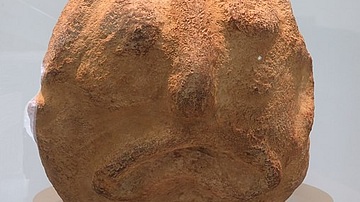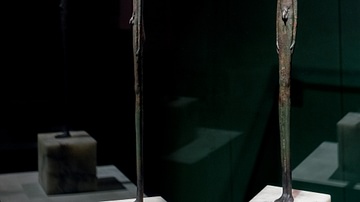Search
Search Results

Image
Iberian Bull Sculpture
Iberian-Celtic bull sculpture from Saguntum (Sagunto), Spain. 4th century BCE. (Archaeological Museum, Sagunto)

Image
The Family Founder Sculpture, Lepenski Vir
The Family Founder (Serbian Cyrillic: Родоначелник) is a quartz sandstone sculpture dating back from c. 6300 – c. 5900 BCE found at Lepenski Vir (Serbia). (Lepenski Vir Museum)

Image
Chokwe Sculpture, Angola
A wooden Chokwe sculpture, Angola, 19th century. The figure is female, likely royal, and has been hollowed out for use as a container for snuff with the head as the stopper. (Brooklyn Museum, New York)

Image
Danubius Sculpture, Lepenski Vir
A quartz sandstone sculpture dating back from c. 6300 – c. 5900 BCE found at Lepenski Vir (Serbia). (Lepenski Vir Museum)

Image
Etruscan 'Evening Shadow' Figure Sculpture
The Etruscan bronze figure sculpture of a young boy known as the Ombre della Sera or 'Evening Shadow'. 3rd century BCE. Height: 57 cm. (Museo Etrusco Guarnacci, Volterra, Italy)

Image
Egyptian Baboon Sculpture
This ancient Egyptian sculpture made of basalt dates from the 13th century BCE and depicts a seated baboon. The baboon was associated with Thoth—the god of wisdom, science, and measurement. Baboons were thus often represented with water clocks...

Image
Nandi Sculpture
A serpentine stone sculpture of Nandi, the sacred bull calf and vehicle of the Hindu god Shiva. The Deccan, India, 1550-1650 CE. (Victoria & Albert Museum, London)

Image
Eastern Han Pig Sculpture
A dolomite sculpture of a recumbent pig. Eastern Han Dynasty, 25-220 CE. Height: 3 cm. Length: 10.6 cm. (Metropolitan Museum of Art, New York)

Image
Pallava Sculpture, Kanchipuram
Sculpture believed to depict a scene from 'Mathavilasa Prahasana' at Thantondreeswara Temple, Kanchipuram, India. 8th century CE.

Image
Nok Sculpture
A terracotta figurine produced by the Nok Culture of southern West Africa (500 BCE - 200 CE). (Louvre Museum, Paris)